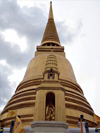|
Wat Bowonniwet Wihaan Rachaworawihaan (วัดบวรนิเวศวิหารราชวรวิหาร)
Thai. ‘Royal Temple Hall and Glorious
Abode’. Name of a temple in
Bangkok's Phra Nakhon
district, which was built in 1826, during the reign of King
Rama III, by order of Somdet Phra
Bowon Racha Chao Maha Sakdi Phonlasep (สมเด็จพระบวรราชเจ้ามหาศักดิพลเสพ),
the twelfth son of King
Rama I, who however, died before
the building was completed. The temple is built in Thai-Chinese
style. Uniquely and
in contrast to most other temples, the
bai sema
of the
ubosot
are built-in on the outer wall of
the
bot
(fig.),
whereas these
boundary markers
around the ordination
hall
are
usually
built as free-standing structures. Inside the ubosot
has murals of the artist
Khrua In-Khohng (ขรัวอินโข่ง), who lived during the reigns of Rama
III-IV, and was the first Thai painter to use perspective and
techniques in murals, adapted from the West. The building houses two
important Buddha images (fig.), i.e. Phra Suwannakhet (สุวรรณเขต), the
Phra prathaan which was moved from Wat Sra Taphaan (วัดสระตะพาน) in
Phetburi
and Phra Phutta
Chinasih (พระพุทธชินสีห์) which was taken
from
Wat Phra Sri Rattanamahathat
in
Phitsanulok.
In the reign of King
Rama IV a large
chedi
covered in gold-coloured tiles was erected and in the present reign
a Chinese shrine and arch were added. In 1836, Prince
bhikku
Mongkut, who in 1824 ordained at
age 20, arrived at this temple and became its first abbot and thus
it became centre of the Thammayut Nikaya sect, founded by Prince Mongkut.
Several members of the Royal House of
Chakri
ordained at this temple, including kings and future kings, such as
Crown
Prince
Mongkutklao
and
Crown
Prince
Prajadhipok (fig.),
and though
King
Chulalongkorn,
already crowned King at age 15, ordained at the age of 20
phansa
in
Wat Phra Sri Rattana Sahtsadahrahm
(fig.),
after his ordination he went to stay at Wat Bowonniwet for 15 days. In 1956, King
Rama IX
stayed at this temple for 15 days after his ordination in
Wat Phra Kaew, and
in 1961 Somdet Phra
Yannasangwon
Somdet
Phrasangkaraat Sagon Maha Sangkaparinayok,
the
Supreme Patriarch of the Buddhist
Church, became the temple's
abbot. Later, crown prince Vajiralongkorn, as well as several of
King
Bhumipon's grandchildren ordained at
this monastery which up to present remains under royal patronage (fig.).
The temple houses a
Dhamma Museum and the Maha Makut (มหามกุฏ)
Buddhist University, one of two public Buddhist universities in
Thailand which was founded in 1893 by King
Rama V, as an educational institute
for the Buddhist clergy and in memory of King Mongkut. Also called and transcribed
Wat Bovoranives Vihara Rajavihara, Wat Bovorn, Wat Bowonniwet and
Wat Bowon, and formerly known as Wat Mai (วัดใหม่), i.e. the ‘New
Temple’.
See MAP,
POSTAGE STAMPS,
TRAVEL PICTURE (1) and
(2), and
WATCH VIDEO.
回






|

